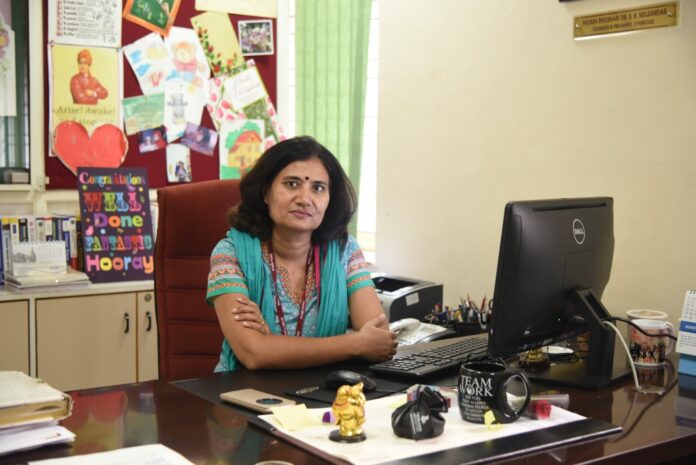Dr. Adya Sharma, Director of Symbiosis Centre of Management Studies, Pune
Since the last decade, the India Skill Report (ISR) series has been grabbing headlines for exploring one of the major aspects of the Indian Education system: employability. Speaking of the latest trends in education and employability, the 2023 edition of ISR came with a ray of hope for B-schools. The study informed that the employability of Indian B-school graduates (MBA holders), clocking 60.62 percent , remains the highest in the country. Similarly, the report said that overall employability jumped over 4 percent in the last year, which means that for 50.3 percent of fresh graduates, the world is their oyster.
Maybe it calls for celebration that half of the country’s fresh talent is employable, given the challenges in educating India’s diverse and immense population, spread across different socio-economic strata. At the same time to the eyes of the seasoned educationist, glued to the vision of seeing a prosperous, enterprising nation, the situation screams glass half-empty.
To begin with, the figure around B-school graduate job readiness- 60.62 percent – suggests that as a country with over 3,000 B-schools, we are yet to effectively cater to about 40 percent of MBA pass-outs sufficiently. Moreover, the overall employability statistic, indicating that almost 50 percent of the youth remains unemployable, calls for retrospection that the educational outcome in our country is hurt by an immense industry-academia schism. As a result, management institutions need to rethink their pedagogic methodology.
Important Announcement – EasyShiksha has now started Online Internship Program “Ab India Sikhega Ghar Se”
In a B-school, candidates are declared successful after they clear a series of examinations. Clearly, given the employability scenario, something new has to be put in place. To elaborate, while examination scores represent essential skills such as good writing abilities, grasp over concepts, and analytical skills, they leave much room for practical ability to execute what is being taught. As a result, there is a chance that stellar performance on paper lends confidence to candidates, despite a lack of proper skills.
Take, for example, well-performing candidates who have been placed in sales positions after B-school. While it is likely they, given their solid academic foundation in business studies, will pick up the skills required sooner than others, it is not necessarily true that the candidates are job-ready. On the other hand, if B-schools insist on practical learning, be it via mandatory internships or by ensuring that candidates complete a project where they achieve decent sales targets, then perhaps, upon graduating, the B-school cohort would hit the ground running. In other words, exams, however important they might be, B-schools must complement them with real-world experiences, case studies, and project-based learning.
Moreover, the ability to solve domain problems goes way beyond quantitative skills and the theoretical knowledge usually gauged in standardised tests. In other words, B-schools should focus on instilling qualities. Qualities such as creativity, which is the critical ingredient of a successful marketing career, or interpersonal skills- the holy grail of Human Resource Management- are seldom accounted for in examinations. To succeed in most corporate roles, these qualities are as important as the core strength related to the position.
ALSO READ: Accelerate Your Career with these Websites Offering Online Certification Courses
Finally, management B-schools should become more cognizant of the important role they play in the education sector. Business institutions, which are regarded as the gateway to rewarding careers, play the buffer between potential talent and recruiters. So, even as top B-schools, in response to rising competition each year, are taking the difficulty level of their standardised entrance tests up by a notch, they should also consider a holistic selection process. The comprehensive approach would ensure that the pool of chosen candidates, who are the product of a system that is again based solely on exams, have more potential than just cramming for tests. Compared to other disciplines, such a discerning step is necessary for management courses because not only is the field directly industry-linked but also witnesses footfalls from candidates across varied backgrounds.
On that note, it is worth noting that a perusal of the ISR report reveals that, despite improvement in employability across disciplines, around 40 percent and 42+ percent of commerce and engineering graduates are not fit for the industry, while a whopping 60+ and 50+ percent of science and humanities students suffer from a lack of industry-relevant grooming. Therefore, to get the best candidates, who have more than mark sheets to show, B-school applications could begin asking for relevant research experience, work experience, a portfolio of hobbies, ascertaining soft skills, and a list of hands-on projects, demonstrating implementable domain knowledge, among other considerations.
All in all, it can be agreed upon that standardised tests have to be supplemented by other methods of evaluation. However, tests still effectively account for many core strengths such as effective communication, good reasoning skills, and academic foundation. That is why, B-schools should combine a multitude of scoring methods based on their industry-ready skills and knowledge, both before declaring a successful MBA graduate or before selecting the B-school cohort. This 360-degree evaluation would not just boost the final employability of MBA pass-outs but also the overall quality of their peers.
This year educate yourself and develop your career with EasyShiksha





































































